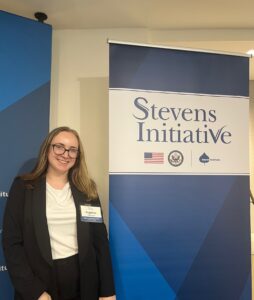Angelina Freeman has a lot to say about The Experiment Digital (TED) program—and with good reason. She has experienced the program from quite possibly every angle. After participating in the program in 2019, she went on to be a program peer mentor, a program facilitator (twice!), and an intern. All this before she came aboard with World Learning as a TED program coordinator.
We asked Freeman about what drew her to The Experiment Digital originally, about her experience throughout all of her roles, and what advice she would give students in today’s program.

TED program coordinator Angelina Freeman was a participant in 2019, then a peer mentor, a two-time facilitator, and an intern.
How did you first hear about TED? What drew you to participate in the program?
I heard about the program because my mom saw a Facebook ad and encouraged me to apply. At the time, I had recently returned from a year with a program that provides full scholarships to American high school youth to spend an academic year in select countries with a significant Muslim population. The experience made me enthusiastic about participating in similar programs.
Can you share one or two memorable experiences from the program?
When I participated in The Experiment Digital and then served as a peer mentor, I was able to form relationships with other participants and have remained in touch with them. Later, I participated in the Stevens Initiative Alumni Fellowship, which is a year-long, hybrid professional development opportunity for alumni of Stevens Initiative programs like TED. I found the opportunity through alumni newsletters and decided to apply! And I was glad I did because it allowed me to reconnect with even more of my fellow participants from my time as a TED participant, bringing our experience full circle.
What drove you to want to be a peer mentor and then a facilitator and intern with the program?
I am passionate about staying engaged in the cultural exchange space and tend to apply for an opportunity when I see it posted. Something great about The Experiment Digital is that there are positions for recent alumni and more professionally mature alumni because there is a progression of roles from peer mentor to facilitator (and in my case, to community engagement facilitator and then intern). I think this does a lot to keep alumni engaged even years after their initial exchange.

Freeman also participated in the Stevens Initiative Alumni Fellowship.
What advice do you give to participants in today’s program to ensure they get the most out of it?
For virtual programs, you really get out what you put in. It can feel easy to half-heartedly participate or put the program on the back burner, but in doing so, you won’t reap the full benefits of the program. The same is true for involvement in the alumni program──the more effort you put in, the more great benefits you will receive. Additionally, you may realize that you don’t fully understand what you have learned or how impactful the program was until years later.
What are your thoughts on a virtual exchange program compared to an in-person program?
I have been fortunate to participate in both in-person and virtual exchange programs. While significantly different from each other, I think both formats bring value in unique ways. In-person programs can be a great way to gain travel experience, dive deep into one culture, and learn languages. However, they can also be inaccessible and disruptive and often do not provide community service or other thematic education.

Freeman in Jordan, where she studied abroad.
Meanwhile, virtual exchange programs allow a student to focus on a specific theme while interacting with peers from many different cultures. The format of virtual programs makes them more accessible and allows participants to remain in their communities and continue their work/studies. Further, I think virtual programs better lend themselves to self-reflection because participants have the time and space to apply the knowledge they are gaining to themselves in their own communities.
What does your day-to-day entail as a program coordinator? What do you enjoy most about it?
As a program coordinator, I do a variety of things to support the successful implementation of The Experiment Digital. For example, I manage our social media accounts, help with advertising and recruitment, support students, review applications, help with curriculum, and more!
One thing I enjoy about the role is that no two days are the same! I have really liked getting to try new things and learning what facets of program management I am most passionate about.


